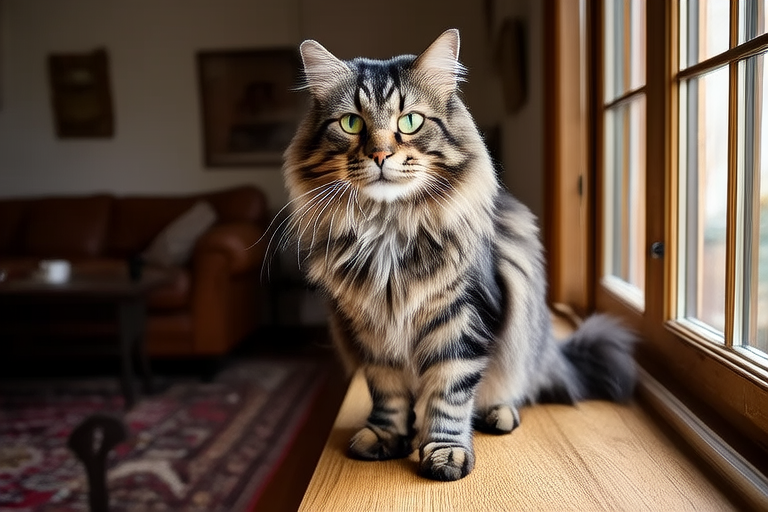The Ultimate Guide to Living with a Maine Coon: Tips and Tricks
Welcome to your comprehensive guide on living with a Maine Coon! These majestic creatures are known for their gentle demeanor, intelligence, and striking appearance. Owning a Maine Coon can be an incredibly rewarding experience, but it also comes with its own set of responsibilities. This guide will walk you through everything you need to know about these delightful felines, from understanding their unique characteristics to providing the best care.
Understanding Your Maine Coon
Maine Coons are one of the largest domestic cat breeds, often reaching sizes that rival small dogs. Their thick, water-repellent coats, tufted ears, and bushy tails make them stand out. They are highly social and enjoy the company of humans and other pets, making them ideal companions for families. Their intelligence sets them apart; they can learn tricks and respond to their names, which makes training easier.
Dietary Needs
Maine Coons have specific dietary requirements due to their large size and active nature. High-quality, protein-rich food is essential to support their muscle mass and overall health. Ensure the food contains real meat as the primary ingredient, avoiding fillers like corn or soy. Always provide fresh water, especially if your cat enjoys playing in water. Consult your veterinarian for personalized feeding guidelines based on age, activity level, and any specific health conditions.
Grooming Requirements
Despite their thick fur, Maine Coons are relatively low-maintenance when it comes to grooming. However, regular brushing is necessary to prevent matting and hairballs. Use a slicker brush or a comb designed for long-haired cats to remove loose hair and distribute skin oils. Bathing is generally unnecessary unless your cat gets particularly dirty. Keep their claws trimmed to prevent scratching damage and discomfort.
Health Concerns
Maine Coons are prone to certain health issues, such as hip dysplasia, hypertrophic cardiomyopathy, and polycystic kidney disease. Regular veterinary check-ups are crucial for early detection and management of these conditions. Genetic testing can also be beneficial to identify potential hereditary diseases. Maintaining a healthy weight and providing a balanced diet can significantly reduce the risk of obesity-related complications.
Suitable Environments
Maine Coons thrive in environments that cater to their playful and curious nature. Provide plenty of vertical spaces, such as cat trees and shelves, where they can climb and observe their surroundings. Interactive toys and puzzle feeders keep them mentally stimulated. While they enjoy outdoor activities, indoor living is safer, especially in areas with predators or harsh weather conditions. If you choose to let them outdoors, consider a secure enclosure or harness training for supervised walks.
Training Methods
Maine Coons are intelligent and can learn various commands and tricks. Positive reinforcement, using treats and praise, is the most effective training method. Start by teaching basic commands like ‘sit’ and ‘come.’ Gradually introduce more complex tricks, always keeping sessions short and fun. Consistency is key, so practice regularly and reward desired behaviors promptly. Clicker training can enhance your training efforts by providing immediate feedback.
Bonding Techniques
Building a strong bond with your Maine Coon requires patience, time, and consistent interaction. Spend quality time together each day, engaging in play sessions or simply lounging around. Maine Coons enjoy being involved in family activities, so include them in daily routines. Respect their boundaries; some may prefer quiet moments alone. Establishing trust and understanding is fundamental to a healthy relationship.
New Owner Tips
If you’re new to owning a Maine Coon, familiarize yourself with breed-specific care before bringing your cat home. Research local veterinarians and pet stores that offer supplies and services tailored to large-breed cats. Prepare your home by setting up a comfortable sleeping area, litter box, and feeding station. Acclimate your new cat gradually, allowing them to explore at their own pace. Patience and consistency will help ease the transition.
Experienced Owner Advice
For those already familiar with Maine Coons, remember that each cat is unique. Pay attention to individual preferences and adapt your care accordingly. Continue learning about advancements in cat care and nutrition to provide the best possible environment. Engage with fellow Maine Coon owners through online forums or local meetups for support and shared experiences. Stay proactive in addressing any behavioral changes or health concerns to ensure your cat remains happy and healthy.
Conclusion
Owning a Maine Coon is a joyful and enriching experience. By understanding their unique needs and providing proper care, you can ensure a long, fulfilling life together. Whether you’re a first-time owner or an experienced cat lover, this guide offers valuable insights to help you create a loving home for your Maine Coon. Embrace the adventure, and cherish every moment spent with your magnificent companion.
